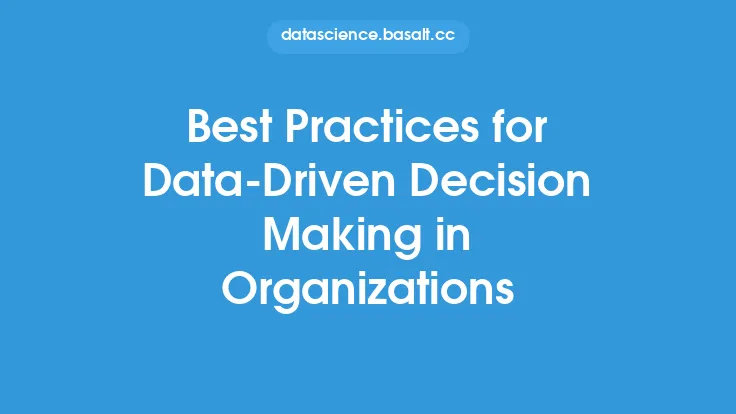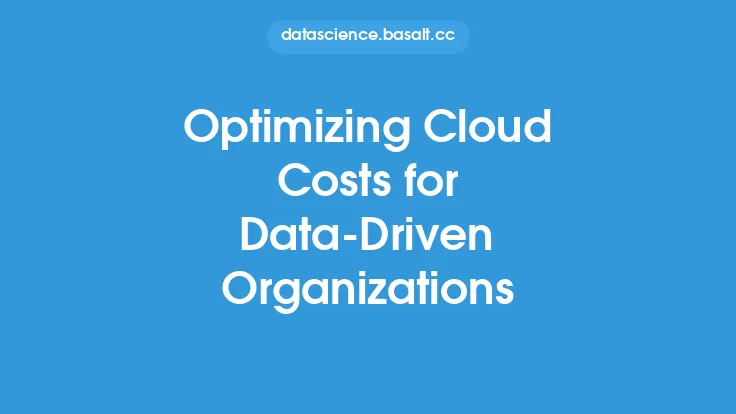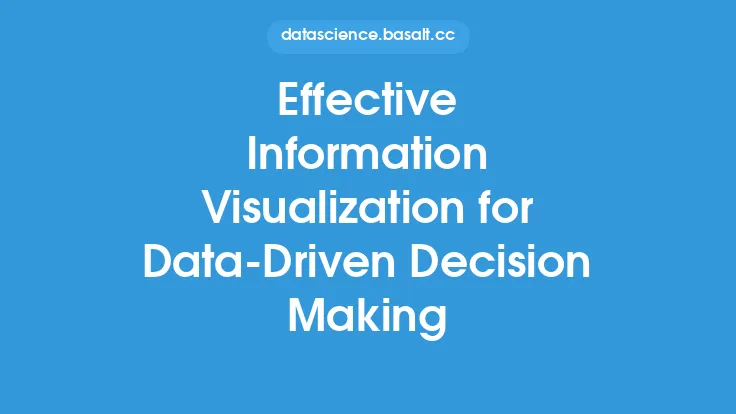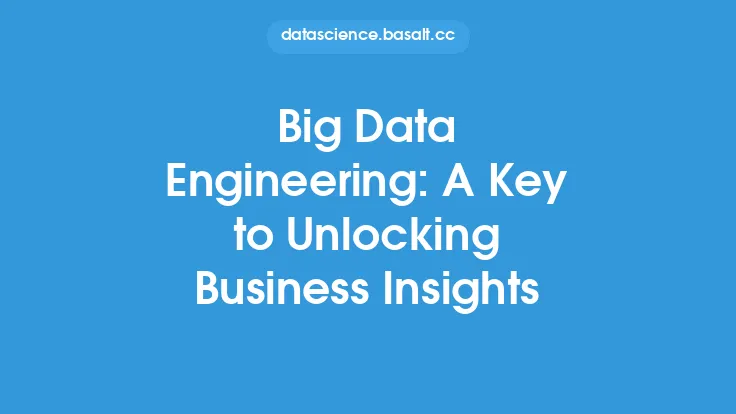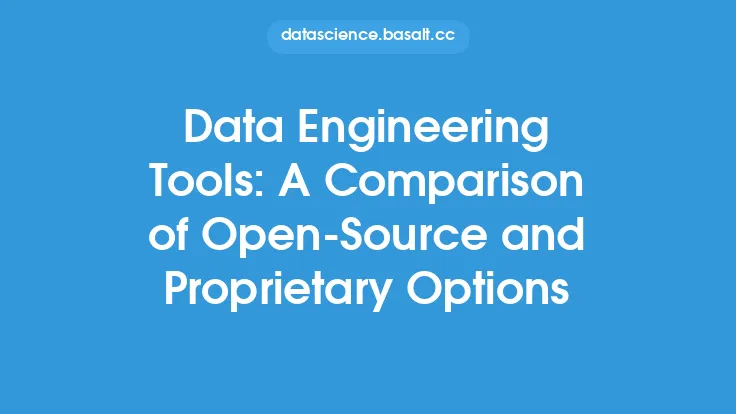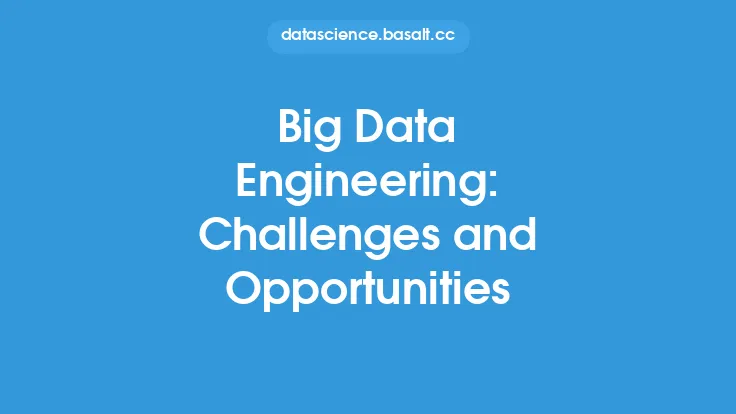In today's data-driven world, organizations are constantly seeking ways to extract insights from the vast amounts of data they generate and collect. Big data engineering plays a crucial role in this pursuit, as it enables companies to design, build, and maintain the complex systems needed to store, process, and analyze large datasets. At its core, big data engineering is about creating scalable, efficient, and reliable architectures that can handle the high volume, velocity, and variety of big data.
Introduction to Big Data Engineering
Big data engineering is a multidisciplinary field that combines concepts from computer science, software engineering, and data science to develop solutions for big data processing and analysis. It involves designing and implementing data pipelines, architectures, and tools that can handle the unique characteristics of big data, such as high dimensionality, noise, and uncertainty. Big data engineers use a range of technologies, including Hadoop, Spark, NoSQL databases, and cloud-based platforms, to build systems that can scale horizontally and vertically to meet the needs of large-scale data processing.
Key Components of Big Data Engineering
Several key components are essential to big data engineering, including data ingestion, storage, processing, and analysis. Data ingestion refers to the process of collecting and transporting data from various sources, such as social media, sensors, and logs, into a centralized system. Data storage involves designing and implementing scalable storage solutions, such as distributed file systems and NoSQL databases, that can handle large volumes of data. Data processing encompasses a range of activities, including data cleaning, transformation, and aggregation, which are typically performed using batch or stream processing frameworks like Hadoop and Spark. Finally, data analysis involves applying statistical and machine learning techniques to extract insights and patterns from the data.
Big Data Engineering Tools and Technologies
A wide range of tools and technologies are available to support big data engineering, including open-source frameworks like Hadoop and Spark, as well as commercial platforms like Google Cloud Bigtable and Amazon Redshift. Hadoop, for example, is a popular framework for batch processing large datasets, while Spark is optimized for in-memory computing and is often used for real-time data processing. NoSQL databases like Cassandra and MongoDB are designed to handle large amounts of unstructured or semi-structured data, while data warehousing platforms like Hive and Impala provide SQL-like interfaces for querying and analyzing big data.
Data Pipeline Architecture
A well-designed data pipeline is critical to big data engineering, as it enables data to be ingested, processed, and analyzed in a scalable and efficient manner. A typical data pipeline consists of several stages, including data ingestion, data processing, data storage, and data analysis. Data ingestion involves collecting data from various sources and transporting it into a centralized system, where it is processed and transformed into a suitable format for analysis. Data processing involves applying various techniques, such as data cleaning and aggregation, to prepare the data for analysis. Data storage involves designing and implementing scalable storage solutions that can handle large volumes of data, while data analysis involves applying statistical and machine learning techniques to extract insights and patterns from the data.
Scalability and Performance in Big Data Engineering
Scalability and performance are critical considerations in big data engineering, as they directly impact the ability of an organization to extract insights from large datasets. Several techniques are used to achieve scalability and performance in big data engineering, including data partitioning, parallel processing, and distributed computing. Data partitioning involves dividing large datasets into smaller, more manageable chunks, which can be processed independently and in parallel. Parallel processing involves using multiple processors or nodes to process data simultaneously, which can significantly improve processing speeds. Distributed computing involves using a network of computers or nodes to process data, which can provide a high degree of scalability and fault tolerance.
Security and Governance in Big Data Engineering
Security and governance are essential considerations in big data engineering, as they ensure that sensitive data is protected and that organizations comply with relevant regulations and standards. Several techniques are used to ensure security and governance in big data engineering, including data encryption, access control, and auditing. Data encryption involves protecting data in transit and at rest using encryption algorithms and protocols, while access control involves restricting access to sensitive data to authorized personnel. Auditing involves monitoring and logging data access and processing activities, which can help detect and prevent security breaches.
Best Practices for Big Data Engineering
Several best practices are essential for successful big data engineering, including designing scalable architectures, using open-source frameworks and tools, and ensuring security and governance. Designing scalable architectures involves using distributed computing and parallel processing techniques to handle large volumes of data, while using open-source frameworks and tools can provide a high degree of flexibility and customization. Ensuring security and governance involves implementing robust security measures, such as data encryption and access control, and complying with relevant regulations and standards.
Conclusion
Big data engineering is a critical component of data-driven organizations, as it enables companies to extract insights from large datasets and make informed business decisions. By understanding the key components of big data engineering, including data ingestion, storage, processing, and analysis, organizations can design and implement scalable and efficient architectures that meet their needs. By using a range of tools and technologies, including open-source frameworks and commercial platforms, big data engineers can build systems that can handle the unique characteristics of big data. By following best practices, such as designing scalable architectures and ensuring security and governance, organizations can ensure that their big data engineering efforts are successful and provide a strong foundation for data-driven decision making.
